换称、转喻、提喻三种修辞手法的定义、用法以及它们之间的异同比较
转喻VS提喻

转喻和提喻的区别转喻(metonymy)提喻(synecdoche) 修辞手法都属于关系类修辞,他们的共同之处都是用某一事物的名称指代另一事物的名称。
目前国内有关英语修辞的教科书中就常将这两种修辞手法混为一谈,使老师和学生对此模糊不清。
其实,如果将这两种修辞手法的定义和用法弄清,就不难区分了。
下面就这两种修辞手法的定义、用法以及它们之间的异同做些比较。
1.转喻的定义与用法用某一事物的名称代替另一事物的名称的修辞手法叫做转喻或借代。
这两种事物之间有着密切相关的联系。
转喻通常用下列几种方式指代。
(1)根据人名或商品品牌名:Uncle Sam(山姆大叔)——Americans or the American government(美国人/美国政府)John Bull(约翰牛)——the English nation or a typical Englishman(英国/地道英国人)He is reading Shakespeare. 他在读莎士比亚作品(Shakespeare’s works 用作者指代作品)He went in debt just to keep up with the Joneses.他为了玉邻里攀比而负债。
(Joneses :neighbors 用“琼斯家”指代“邻里”)(2)根据实物名称Finally she married money. 她最终嫁给了有钱人。
(a rich man用“钱”指代“有钱人”)I live near an airport and passing planes can be heard night and day.我住在飞机场附近,日夜可听到过往的飞机声。
(the noise made by passing planes用“过往的飞机”指代“噪音”)(3)根据动植物名称The big apple(大苹果)——New York city(纽约市)Russian bear(俄国熊)——Russians or the Russian government(俄国/俄国政府)British lion(英国狮)——England or the English government(英国/英国政府)The flower of the nation was sent off to war.该国的壮小伙子都被送去打仗了。
英语最全修辞手法

英语常用修辞1.Simile 明喻明喻是将具有共性的不同事物作对比。
这种共性存在于人们的心里,而不是事物的自然属性。
或者说是以两种具有相同特征的事物和现象进行对比,表明本体和喻体之间的相似关系,两者都在对比中出现。
标志词常用like,as, seem, as if, as though, similar to,such as等。
It is a figure of speech which makes a comparison between two unlike elements having at least one quality or characteristic in common。
To make the comparison,words like as, as.。
as,as if and like are used to transfer the quality we associate with one to the other.例如:1〉.He was like a cock who thought the sun had risen to hear him crow。
2〉.I wandered lonely as c cloud.3〉。
Einstein only had a blanket on,as if he had just walked out of a fairy tale.4>。
This elephant is like a snake as anybody can see.这头象和任何人见到的一样像一条蛇。
5〉.He looked as if he had just stepped out of my book of fairytales and had passed me like a spirit。
他看上去好像刚从我的童话故事书中走出来,像幽灵一样从我身旁走过去。
换喻与提喻差异的认知分析

换喻与提喻差异的认知分析
换喻和提喻是一种比喻修辞,是两种修辞方法形式上的变体,其基
本思想是直接将抽象的概念比喻为具体实物,以增强语言表达效果。
但是它们存在着明显的差异,如下:
一、换喻是把两种客观事物从某种意义上进行比较,再换一种表达来
表现,它把一种概念替换成另一种概念、两种概念交换,用更有生命
力的语言表示出来,如把“令人光荣”比喻为“容光焕发”。
二、提喻是把一种客观事物比作另一种事物概念,也就是把抽象的概
念比喻成具体的实物,如把“坚守原则”比喻为“立足坚磐”。
综上所述,换喻与提喻在使用方式上是有差异的,需要适时运用,才
能更有效地表达出自己的观点和感受,从而达到加强语言表达的作用。
英语作文中的常见修辞手法
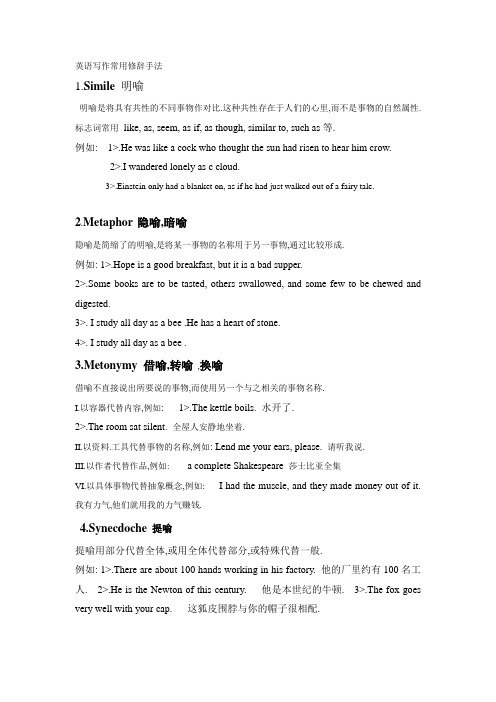
英语写作常用修辞手法1.Simile明喻明喻是将具有共性的不同事物作对比.这种共性存在于人们的心里,而不是事物的自然属性. 标志词常用like, as, seem, as if, as though, similar to, such as等.例如: 1>.He was like a cock who thought the sun had risen to hear him crow.2>.I wandered lonely as c cloud.3>.Einstein only had a blanket on, as if he had just walked out of a fairy tale.2.Metaphor隐喻,暗喻隐喻是简缩了的明喻,是将某一事物的名称用于另一事物,通过比较形成.例如: 1>.Hope is a good breakfast, but it is a bad supper.2>.Some books are to be tasted, others swallowed, and some few to be chewed and digested.3>. I study all day as a bee .He has a heart of stone.4>. I study all day as a bee .3.Metonymy 借喻,转喻,换喻借喻不直接说出所要说的事物,而使用另一个与之相关的事物名称.I.以容器代替内容,例如: 1>.The kettle boils. 水开了.2>.The room sat silent. 全屋人安静地坐着.II.以资料.工具代替事物的名称,例如: Lend me your ears, please. 请听我说.III.以作者代替作品,例如: a complete Shakespeare 莎士比亚全集VI.以具体事物代替抽象概念,例如: I had the muscle, and they made money out of it. 我有力气,他们就用我的力气赚钱.4.Synecdoche提喻提喻用部分代替全体,或用全体代替部分,或特殊代替一般.例如: 1>.There are about 100 hands working in his factory. 他的厂里约有100名工人. 2>.He is the Newton of this century. 他是本世纪的牛顿. 3>.The fox goes very well with your cap. 这狐皮围脖与你的帽子很相配.5.Personification 拟人拟人是把生命赋予无生命的事物.例如: 1>.The night gently lays her hand at our fevered heads.2>.I was very happy and could hear the birds singing in the woods.6.Irony 反语反语指用相反意义的词来表达意思的作文方式.如在指责过失.错误时,用赞同过失的说法,而在表扬时,则近乎责难的说法.例如: 1>.It would be a fine thing indeed not knowing what time it was in the morning. 2>"Of course, you only carry large notes, no small change on you. "the waiter said to the beggar..Allegory讽喻,比方这是一种源于希腊文的修辞法,意为"换个方式的说法".它是一种形象的描述,具有双重性,表层含义与真正意味的是两回事.例如: 1>.Make the hay while the sun shines.2>.It's time to turn plough into sword.7.Hyperbole 夸张overstatement understatement夸张是以言过其实的说法表达强调的目的.它可以加强语势,增加表达效果..例如: 1>.I beg a thousand pardons.2>.Love you. You are the whole world to me, and the moon and the stars.3>.When she heard the bad news, a river of tears poured out.8.Euphemism 委婉,婉辞法婉辞法指用委婉,文雅的方法表达粗恶,避讳的话. 例如:1>.He is out visiting the necessary. 他出去方便一下.2>.His relation with his wife has not been fortunate. 他与妻子关系不融洽.3>.Deng Xiaoping passed away in 19979. 移位修饰transferred epithet将本应该用来修饰某一类名词的修饰语用来修饰另一类名词。
修辞格“转喻”与“提喻”的区别

5)以与甲事物密切相关的乙事物代替甲事物
• The camp (= the army), the pulpit (= the religion) and the law for rich men’s sons are free. 兵营,布道坛和法律保障有钱人的子 孙无忧无虑。 • She took the veil (= a nun’s head-covering) at 20. (= She became a nun at 20.) 她20岁开始 当尼姑。 • brought to / under the hammer (= the mallet used at auction) (= put to auction) 拿去拍卖
• We have several Turners (= pictures by Turner). 我们有几张特纳所做的画。 • Have you got a Hornby (= a copy of the dictionary by Hornby )? 你有一本荷恩毕编的 词典吗? • I have never read Homer (= the poems of Homer). 我从未读过荷马的诗。
9)以某物的产地代替某物
• O Knight, thou lackest a cup of canary, when did I see you so put down? (Shakespeare : Twelfth Night ) 啊,骑士!你需一杯加那利酒,什么时候我看到 你这么沉默?(注:加那利白葡萄酒原产于加那 利群岛。) • Would you have a glass of champagne? 你喝杯香槟 酒好吗?(注:Champagne,法国东部一地区, 所产葡萄酒很著名,通常称香槟酒。)
转喻法提喻法等的区别
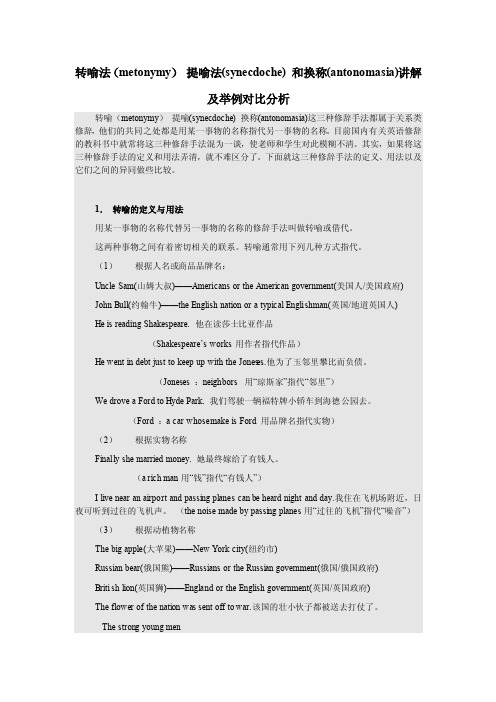
转喻法(metony my)提喻法(synecd oche)和换称(antono masia)讲解及举例对比分析转喻(metony my)提喻(synecd oche)换称(antono masia)这三种修辞手法都属于关系类修辞,他们的共同之处都是用某一事物的名称指代另一事物的名称。
目前国内有关英语修辞的教科书中就常将这三种修辞手法混为一谈,使老师和学生对此模糊不清。
其实,如果将这三种修辞手法的定义和用法弄清,就不难区分了。
下面就这三种修辞手法的定义、用法以及它们之间的异同做些比较。
1.转喻的定义与用法用某一事物的名称代替另一事物的名称的修辞手法叫做转喻或借代。
这两种事物之间有着密切相关的联系。
转喻通常用下列几种方式指代。
(1)根据人名或商品品牌名:UncleSam(山姆大叔)——Americ ans or the Americ an govern ment(美国人/美国政府)John Bull(约翰牛)——the Englis h nation or a typica l Englis hman(英国/地道英国人)He is readin g Shakes peare. 他在读莎士比亚作品(Shakes peare’sworks用作者指代作品)He went in debt just to keep up with the Jonese s.他为了玉邻里攀比而负债。
(Jonese s :neighb ors 用“琼斯家”指代“邻里”)We drovea Ford to Hyde Park. 我们驾驶一辆福特牌小轿车到海德公园去。
(Ford :a car whosemake is Ford 用品牌名指代实物)(2)根据实物名称Finall y she marrie d money.她最终嫁给了有钱人。
换称 借代修辞对比
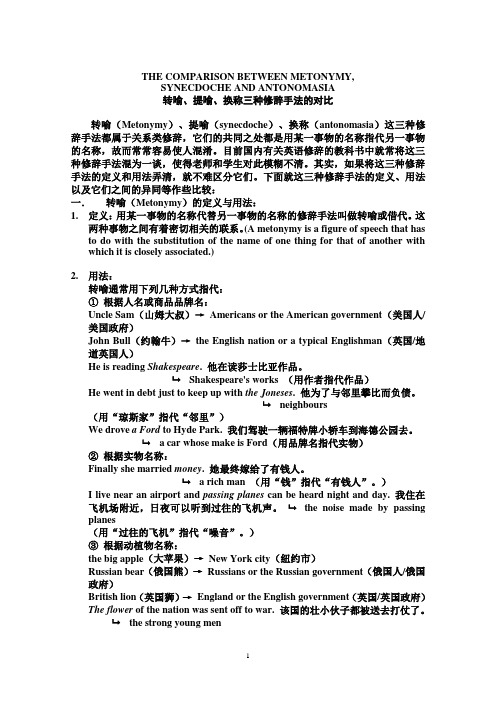
THE COMPARISON BETWEEN METONYMY,SYNECDOCHE AND ANTONOMASIA转喻、提喻、换称三种修辞手法的对比转喻(Metonymy)、提喻(synecdoche)、换称(antonomasia)这三种修辞手法都属于关系类修辞,它们的共同之处都是用某一事物的名称指代另一事物的名称,故而常常容易使人混淆。
目前国内有关英语修辞的教科书中就常将这三种修辞手法混为一谈,使得老师和学生对此模糊不清。
其实,如果将这三种修辞手法的定义和用法弄清,就不难区分它们。
下面就这三种修辞手法的定义、用法以及它们之间的异同等作些比较:一.转喻(Metonymy)的定义与用法:1.定义:用某一事物的名称代替另一事物的名称的修辞手法叫做转喻或借代。
这两种事物之间有着密切相关的联系。
(A metonymy is a figure of speech that has to do with the substitution of the name of one thing for that of another with which it is closely associated.)2.用法:转喻通常用下列几种方式指代:①根据人名或商品品牌名:Uncle Sam(山姆大叔)→Americans or the American government(美国人/美国政府)John Bull(约翰牛)→the English nation or a typical Englishman(英国/地道英国人)He is reading Shakespeare. 他在读莎士比亚作品。
Shakespeare's works (用作者指代作品)He went in debt just to keep up with the Joneses. 他为了与邻里攀比而负债。
neighbours(用“琼斯家”指代“邻里”)We drove a Ford to Hyde Park. 我们驾驶一辆福特牌小轿车到海德公园去。
转喻、提喻、换称三种修辞手法的对比

THE COMPARISON BETWEEN METONYMY,SYNECDOCHE AND ANTONOMASIA转喻、提喻、换称三种修辞手法的对比转喻(Metonymy)、提喻(synecdoche)、换称(antonomasia)这三种修辞手法都属于关系类修辞,它们的共同之处都是用某一事物的名称指代另一事物的名称,故而常常容易使人混淆。
目前国内有关英语修辞的教科书中就常将这三种修辞手法混为一谈,使得老师和学生对此模糊不清。
其实,如果将这三种修辞手法的定义和用法弄清,就不难区分它们。
下面就这三种修辞手法的定义、用法以及它们之间的异同等作些比较:一.转喻(Metonymy)的定义与用法:1.定义:用某一事物的名称代替另一事物的名称的修辞手法叫做转喻或借代。
这两种事物之间有着密切相关的联系。
(A metonymy is a figure of speech that has to do with the substitution of the name of one thing for that of another with which it is closely associated.)2.用法:转喻通常用下列几种方式指代:①根据人名或商品品牌名:Uncle Sam(山姆大叔)→Americans or the American government(美国人/美国政府)John Bull(约翰牛)→the English nation or a typical Englishman(英国/地道英国人)He is reading Shakespeare. 他在读莎士比亚作品。
Shakespeare's works (用作者指代作品)He went in debt just to keep up with the Joneses. 他为了与邻里攀比而负债。
neighbours(用“琼斯家”指代“邻里”)We drove a Ford to Hyde Park. 我们驾驶一辆福特牌小轿车到海德公园去。
英语22种修辞手法以及例句归纳总结
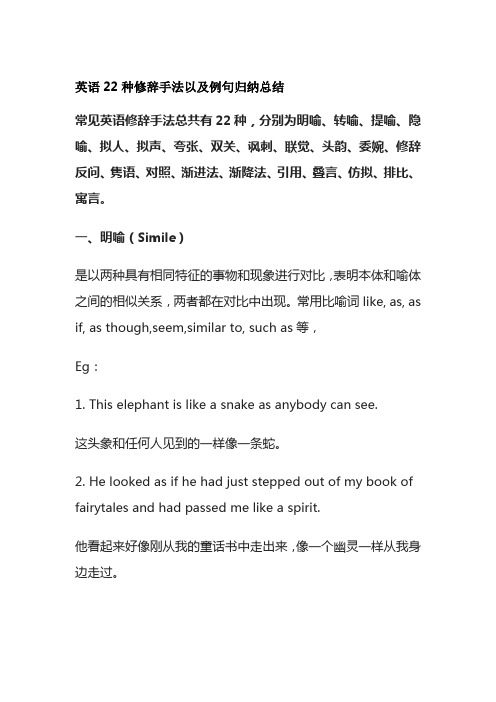
英语22种修辞手法以及例句归纳总结常见英语修辞手法总共有22种,分别为明喻、转喻、提喻、隐喻、拟人、拟声、夸张、双关、讽刺、联觉、头韵、委婉、修辞反问、隽语、对照、渐进法、渐降法、引用、叠言、仿拟、排比、寓言。
一、明喻(Simile)是以两种具有相同特征的事物和现象进行对比,表明本体和喻体之间的相似关系,两者都在对比中出现。
常用比喻词like, as, as if, as though,seem,similar to, such as等,Eg:1. This elephant is like a snake as anybody can see.这头象和任何人见到的一样像一条蛇。
2. He looked as if he had just stepped out of my book of fairytales and had passed me like a spirit.他看起来好像刚从我的童话书中走出来,像一个幽灵一样从我身边走过。
3. It has long leaves that sway in the wind like slim fingers reaching to touch something.它那长长的叶子在风中摆动,好像伸出纤细的手指去触摸什么东西似的。
二、隐喻(Metaphor)这种比喻不通过比喻词进行,而是直接将用事物当作乙事物来描写,甲乙两事物之间的联系和相似之处是暗含的。
Eg:1、The diamond department was the heart and center of the store.钻石部是商店的心脏和核心。
2. He is a pig.他简直是头猪。
(比喻:他是一个像猪一般的人,指肮脏,贪吃的人。
)3. She is a woman with a stony heart.她是一个铁石心肠的女人。
(比喻:这个女人冷酷无情。
)4.Mark Twain is a mirror of America.马克•吐温是美国的一面镜子。
换称、转喻、提喻三种修辞手法的定义、用法以及它们之间的异同比较

换称、转喻、提喻三种修辞手法的对比换称(antonomasia)、转喻(Metonymy)、提喻(synecdoche)这三种修辞手法都属于关系类修辞,它们的共同之处都是用某一事物的名称指代另一事物的名称,故而常常容易使人混淆。
目前国内有关英语修辞的教科书中就常将这三种修辞手法混为一谈,使得老师和学生对此模糊不清。
其实,如果将这三种修辞手法的定义和用法弄清,就不难区分它们。
下面就这三种修辞手法的定义、用法以及它们之间的异同等作些比较:一:换称(Antonomasia)的定义与用法:定义:用头衔、绰号和称呼等代替姓名或称谓或用专有名词代替普通名词的修辞手法叫做换称。
(An antonomasia is a figure of speech that involves the use of an epithet or title in place of a name, and also the use of a proper name in place of a common noun.)用法:①用头衔、绰号和称呼等代替姓名或称谓:His Majesty(陛下)→a king or the name of the king(国王或国王的姓名)His Honor(阁下)→a judge or the name of the judge(法官或法官的姓名)Iron Chancellor(铁血宰相)→Bismarck (俾斯麦)②用专有名词代替普通名词:a.源于宗教或神话:Solomon(所罗门)→a wise man(聪明人)Judas(犹大)→a traitor(叛徒)Helen(海伦)→a beautiful woman(美女)b.源于历史:Hitler(希特勒)→a tyrant(暴君)He is the Newton of this century. 他是本世纪的牛顿。
9 a great scientistMilton(弥尔顿)→a poet(诗人)c.源于文学作品:二、转喻(Metonymy)的定义与用法:定义:用某一事物的名称代替另一事物的名称的修辞手法叫做转喻或借代。
英语19种修辞手法的全部解释和例句
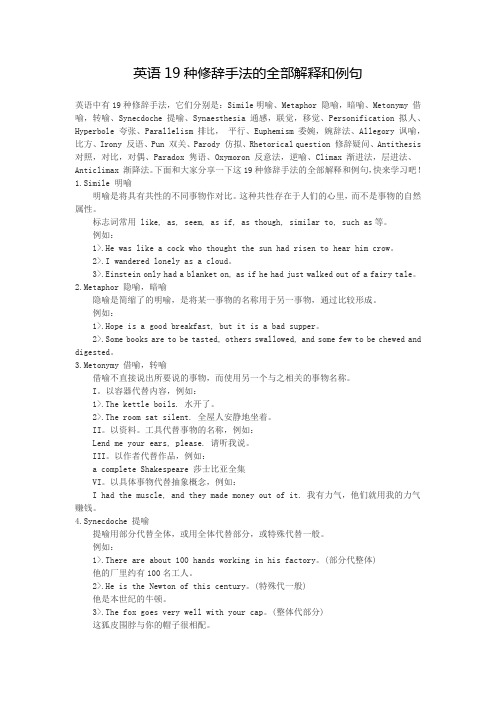
英语19种修辞手法的全部解释和例句英语中有19种修辞手法,它们分别是:Simile明喻、Metaphor 隐喻,暗喻、Metonymy 借喻,转喻、Synecdoche 提喻、Synaesthesia 通感,联觉,移觉、Personification 拟人、Hyperbole 夸张、Parallelism 排比,平行、Euphemism 委婉,婉辞法、Allegory 讽喻,比方、Irony 反语、Pun 双关、Parody 仿拟、Rhetorical question 修辞疑问、Antithesis 对照,对比,对偶、Paradox 隽语、Oxymoron 反意法,逆喻、Climax 渐进法,层进法、Anticlimax 渐降法。
下面和大家分享一下这19种修辞手法的全部解释和例句,快来学习吧!1.Simile 明喻明喻是将具有共性的不同事物作对比。
这种共性存在于人们的心里,而不是事物的自然属性。
标志词常用 like, as, seem, as if, as though, similar to, such as等。
例如:1>.He was like a cock who thought the sun had risen to hear him crow。
2>.I wandered lonely as a cloud。
3>.Einstein only had a blanket on, as if he had just walked out of a fairy tale。
2.Metaphor 隐喻,暗喻隐喻是简缩了的明喻,是将某一事物的名称用于另一事物,通过比较形成。
例如:1>.Hope is a good breakfast, but it is a bad supper。
2>.Some books are to be tasted, others swallowed, and some few to be chewed and digested。
转喻法提喻法和换称等地例句和区别
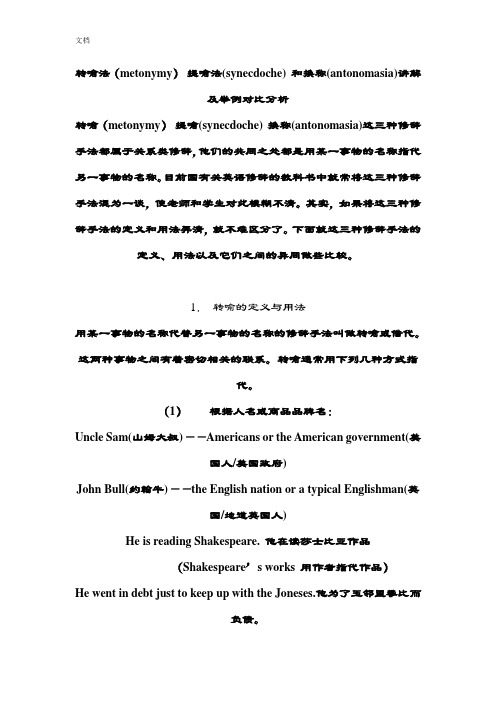
转喻法(metonymy)提喻法(synecdoche) 和换称(antonomasia)讲解及举例对比分析转喻(metonymy)提喻(synecdoche) 换称(antonomasia)这三种修辞手法都属于关系类修辞,他们的共同之处都是用某一事物的名称指代另一事物的名称。
目前国有关英语修辞的教科书中就常将这三种修辞手法混为一谈,使老师和学生对此模糊不清。
其实,如果将这三种修辞手法的定义和用法弄清,就不难区分了。
下面就这三种修辞手法的定义、用法以及它们之间的异同做些比较。
1.转喻的定义与用法用某一事物的名称代替另一事物的名称的修辞手法叫做转喻或借代。
这两种事物之间有着密切相关的联系。
转喻通常用下列几种方式指代。
(1)根据人名或商品品牌名:Uncle Sam(山姆大叔)——Americans or the American government(美国人/美国政府)John Bull(约翰牛)——the English nation or a typical Englishman(英国/地道英国人)He is reading Shakespeare. 他在读莎士比亚作品(Shakespeare’s works 用作者指代作品)He went in debt just to keep up with the Joneses.他为了玉邻里攀比而负债。
(Joneses :neighbors 用“琼斯家”指代“邻里”)We drove a Ford to Hyde Park. 我们驾驶一辆福特牌小轿车到海德公园去。
(Ford :a car whose make is Ford 用品牌名指代实物)(2)根据实物名称Finally she married money. 她最终嫁给了有钱人。
(a rich man用“钱”指代“有钱人”)I live near an airport and passing planes can be heard night and day.我住在飞机场附近,日夜可听到过往的飞机声。
转喻和提喻
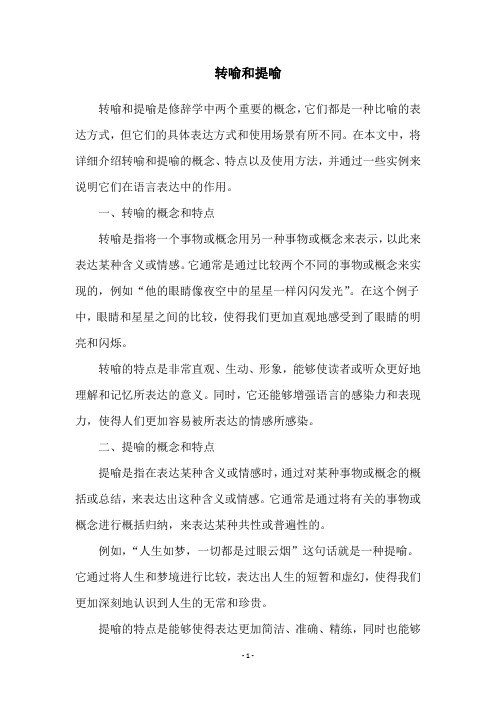
转喻和提喻转喻和提喻是修辞学中两个重要的概念,它们都是一种比喻的表达方式,但它们的具体表达方式和使用场景有所不同。
在本文中,将详细介绍转喻和提喻的概念、特点以及使用方法,并通过一些实例来说明它们在语言表达中的作用。
一、转喻的概念和特点转喻是指将一个事物或概念用另一种事物或概念来表示,以此来表达某种含义或情感。
它通常是通过比较两个不同的事物或概念来实现的,例如“他的眼睛像夜空中的星星一样闪闪发光”。
在这个例子中,眼睛和星星之间的比较,使得我们更加直观地感受到了眼睛的明亮和闪烁。
转喻的特点是非常直观、生动、形象,能够使读者或听众更好地理解和记忆所表达的意义。
同时,它还能够增强语言的感染力和表现力,使得人们更加容易被所表达的情感所感染。
二、提喻的概念和特点提喻是指在表达某种含义或情感时,通过对某种事物或概念的概括或总结,来表达出这种含义或情感。
它通常是通过将有关的事物或概念进行概括归纳,来表达某种共性或普遍性的。
例如,“人生如梦,一切都是过眼云烟”这句话就是一种提喻。
它通过将人生和梦境进行比较,表达出人生的短暂和虚幻,使得我们更加深刻地认识到人生的无常和珍贵。
提喻的特点是能够使得表达更加简洁、准确、精练,同时也能够使得表达更加具有概括性和普适性。
它常常被用于文学作品中,以表达深刻的思想和情感。
三、转喻和提喻的使用方法转喻和提喻都是一种比喻的表达方式,它们的使用方法有很多,这里只列举一些常用的方法。
1.通过形象的比喻来进行转喻形象的比喻是指将一个事物或概念通过与另一种事物进行比较,来表达出其特点或含义。
例如“他的心像一池死水,没有一点波澜”,这个比喻通过将心与死水进行比较,来表达出他的心境平静、缺乏活力的特点。
2.通过概括的方式来进行提喻概括的方式是指通过对某种事物或概念的总结和概括,来表达出其共性和普遍性。
例如“人生如梦,一切都是过眼云烟”,这个提喻通过将人生和梦境进行比较,来表达出人生的短暂和虚幻。
转喻和提喻的定义与区别
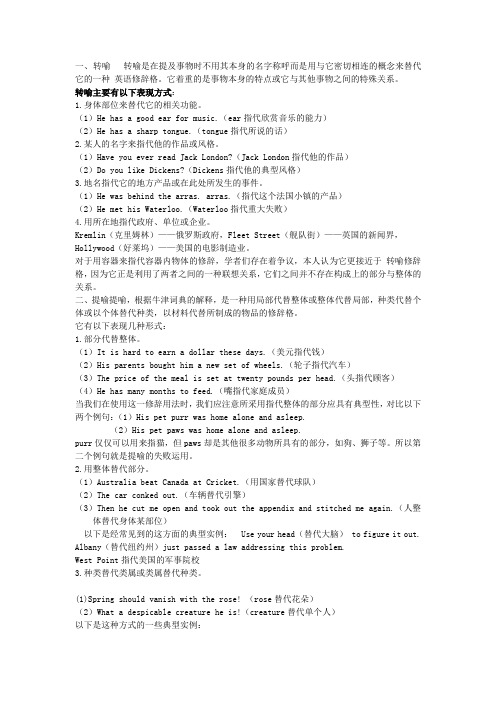
一、转喻转喻是在提及事物时不用其本身的名字称呼而是用与它密切相连的概念来替代它的一种英语修辞格。
它着重的是事物本身的特点或它与其他事物之间的特殊关系。
转喻主要有以下表现方式:1.身体部位来替代它的相关功能。
(1)He has a good ear for music.(ear指代欣赏音乐的能力)(2)He has a sharp tongue.(tongue指代所说的话)2.某人的名字来指代他的作品或风格。
(1)Have you ever read Jack London?(Jack London指代他的作品)(2)Do you like Dickens?(Dickens指代他的典型风格)3.地名指代它的地方产品或在此处所发生的事件。
(1)He was behind the arras. arras.(指代这个法国小镇的产品)(2)He met his Waterloo.(Waterloo指代重大失败)4.用所在地指代政府、单位或企业。
Kremlin(克里姆林)——俄罗斯政府,Fleet Street(舰队街)——英国的新闻界,Hollywood(好莱坞)——美国的电影制造业。
对于用容器来指代容器内物体的修辞,学者们存在着争议,本人认为它更接近于转喻修辞格,因为它正是利用了两者之间的一种联想关系,它们之间并不存在构成上的部分与整体的关系。
二、提喻提喻,根据牛津词典的解释,是一种用局部代替整体或整体代替局部,种类代替个体或以个体替代种类,以材料代替所制成的物品的修辞格。
它有以下表现几种形式:1.部分代替整体。
(1)It is hard to earn a dollar these days.(美元指代钱)(2)His parents bought him a new set of wheels.(轮子指代汽车)(3)The price of the meal is set at twenty pounds per head.(头指代顾客)(4)He has many months to feed.(嘴指代家庭成员)当我们在使用这一修辞用法时,我们应注意所采用指代整体的部分应具有典型性,对比以下两个例句:(1)His pet purr was home alone and asleep.(2)His pet paws was home alone and asleep.purr仅仅可以用来指猫,但paws却是其他很多动物所具有的部分,如狗、狮子等。
英语最全修辞手法
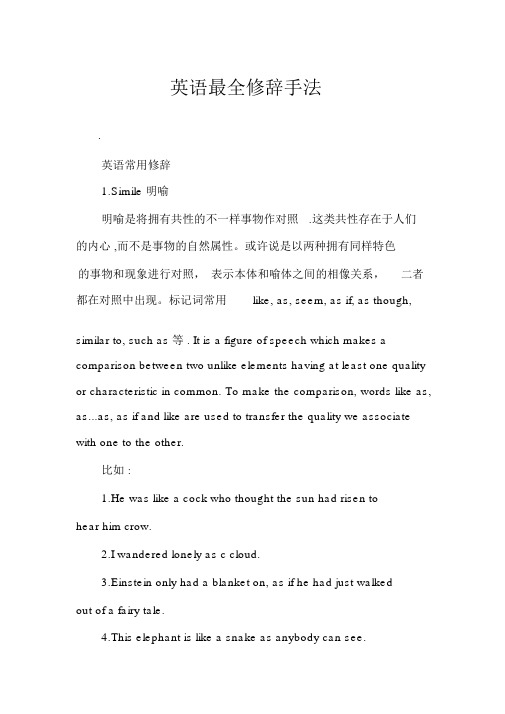
英语最全修辞手法.英语常用修辞1.Simile 明喻明喻是将拥有共性的不一样事物作对照.这类共性存在于人们的内心 ,而不是事物的自然属性。
或许说是以两种拥有同样特色的事物和现象进行对照,表示本体和喻体之间的相像关系,二者都在对照中出现。
标记词常用like, as, seem, as if, as though, similar to, such as 等 . It is a figure of speech which makes a comparison between two unlike elements having at least one quality or characteristic in common. To make the comparison, words like as, as...as, as if and like are used to transfer the quality we associate with one to the other.比如 :1.He was like a cock who thought the sun had risen tohear him crow.2.I wandered lonely as c cloud.3.Einstein only had a blanket on, as if he had just walkedout of a fairy tale.4.This elephant is like a snake as anybody can see.这头象和任何人见到的同样像一条蛇。
5.He looked as if he had just stepped out of my book of fairytales andhad passed me like a spirit.他看上去仿佛刚从我的童话故事书中走出来,像幽灵同样从我身边走过去。
换喻和转喻的区别

例3: I have never read Li Bai. 我从未读过李白的诗。 Li Bai's poems (通过动词read,可以联想到此句中的“李白”是指“李白 的诗”。虽然“李白”是我国唐代著名诗人,但该句并没有 利用他的某个特点进行借代,所以它不是antonomasia。而 “李白”与“李白的诗”之间具有密切相关的联系,故该句 所采用的修辞手法是metonymy。) 例4: You Judas! 你这个叛徒! a traitor (根据《圣经》,犹大是耶稣十二个门徒之一,他为了三十 枚纹银出卖了耶稣。根据这一典故,“犹大”便成了“出卖 朋友的人”和“叛徒”的代名词。该句是利用典故中的典型 人物的特点来借代,故它所采用的修辞手法是 antonomasia。)
Some mute inglorious Milton here may rest.某个沉默的、 无名诗人也许在此长眠。(antonomasia——用米尔顿代诗 人)
转喻(metonymy)与换称 (antonomasia)的比较:
metonymy与antonomasia共同之处是它们 都可以用人名或地名来借代人物或事物; 它们的不同点在于:metonymy中的借代物 与被借代物之间通常具有等同关系或密切 相关的联系,而antonomasia通常是利用人 的头衔、绰号,或利用历史上的名人、名 胜以及小说、典故中的典型人物的特点来 借代。并且,它通常是用专有名词指代普 通名词。
metonymy中的借代物与被借代物之间通常具有等同关系或密切相关的联系而antonomasia通常是利用人的头衔绰号或利用历史上的名人名胜以及小说典故中的典型人物的特点来借代
换喻和转喻的区别
高考九种常见修辞手法的含义、作用(效果)及比较
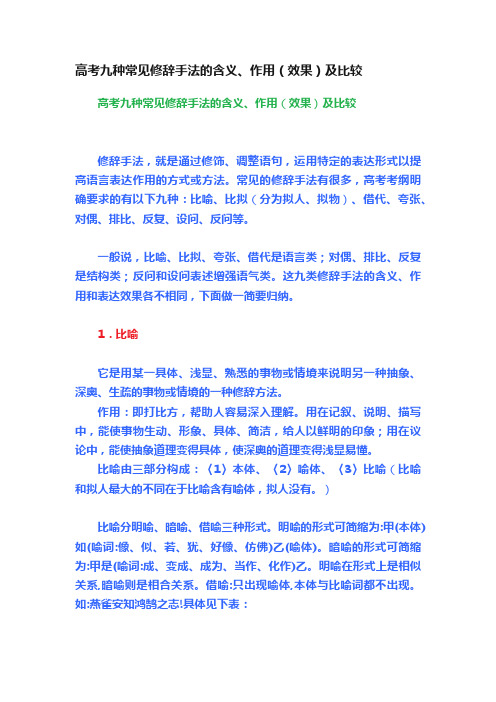
高考九种常见修辞手法的含义、作用(效果)及比较高考九种常见修辞手法的含义、作用(效果)及比较修辞手法,就是通过修饰、调整语句,运用特定的表达形式以提高语言表达作用的方式或方法。
常见的修辞手法有很多,高考考纲明确要求的有以下九种:比喻、比拟(分为拟人、拟物)、借代、夸张、对偶、排比、反复、设问、反问等。
一般说,比喻、比拟、夸张、借代是语言类;对偶、排比、反复是结构类;反问和设问表述增强语气类。
这九类修辞手法的含义、作用和表达效果各不相同,下面做一简要归纳。
1.比喻它是用某一具体、浅显、熟悉的事物或情境来说明另一种抽象、深奥、生疏的事物或情境的一种修辞方法。
作用:即打比方,帮助人容易深入理解。
用在记叙、说明、描写中,能使事物生动、形象、具体、简洁,给人以鲜明的印象;用在议论中,能使抽象道理变得具体,使深奥的道理变得浅显易懂。
比喻由三部分构成:〈1〉本体、〈2〉喻体、〈3〉比喻(比喻和拟人最大的不同在于比喻含有喻体,拟人没有。
)比喻分明喻、暗喻、借喻三种形式。
明喻的形式可简缩为:甲(本体)如(喻词:像、似、若、犹、好像、仿佛)乙(喻体)。
暗喻的形式可简缩为:甲是(喻词:成、变成、成为、当作、化作)乙。
明喻在形式上是相似关系,暗喻则是相合关系。
借喻:只出现喻体,本体与比喻词都不出现。
如:燕雀安知鸿鹄之志!具体见下表:【附】通感所谓通感,是利用诸种感觉相互交通的心理现象,以一种感觉来描述表现另一种感觉的修辞方式。
作用:通感的运用可以收到令人回味无穷的效果,其表达作用是无可替代的。
它能化抽象为形象,让读者更好地理解;它能由此及彼,勾起人们丰富的联想;它能不拘一格,行文活泼;它能准确表达,含意深远;它能充实诗文的意境,构成特殊的艺术美。
最典型的例子:“微风过处,送来缕缕清香,仿佛远处高楼上渺茫的歌声似的。
”(朱自清《荷塘月色》)清香乃是嗅觉,歌声乃是听觉,作者将两种感觉互通,即为通感。
此外有:“晨钟云外湿”(杜甫《夔州雨湿不得上岸作》)以“湿”字形容钟声,所闻之钟声,穿雨而来,穿云而去,故“湿”,触觉与听觉相互沟通。
英语修辞中的相似辞格辨析

英语修辞中的相似辞格辨析安琦【摘要】英语修辞格中有许多辞格都很相似,学习者在学习中常常无法辨别,难以在实际中正确使用.英语修辞格中的提喻和转喻,转喻和换喻,委婉和含蓄,轭式修饰法和一笔双叙这几对常用的辞格因其有共同之处,常常容易混淆.通过对这些相似辞格从词源、概念、结构、特征和运用等方面进行辨析,再辅以例句的讲解,教师和学生便可以区分它们的差别,明确它们的意义和使用场合,并将其准确地运用到实际中.【期刊名称】《吉林师范大学学报(人文社会科学版)》【年(卷),期】2012(040)002【总页数】3页(P46-48)【关键词】英语修辞;相似辞格;对比;异同;辨析【作者】安琦【作者单位】内蒙古民族大学外国语学院,内蒙古通辽028000【正文语种】中文【中图分类】H315语言是交流的工具,修辞则是语言表达的艺术。
随着社会的发展和文明的进步,人们对语言的要求也随之增高了。
人们在交往中,语言不仅要清晰流畅,符合语法,更要生动鲜明,吸引听者的注意力。
英语修辞学诞生于亚里士多德时代,是一门古老的学科,包含了近百种修辞手法,常用的就有三十余种。
这些辞格中有很多相似的辞格,这些辞格一直困扰着教师和学生们。
所以对常用辞格中的相似辞格进行总结归纳,有助于学习者更准确地掌握和运用这些辞格。
在比喻修辞格中,提喻和转喻常常是使学生难以区分的辞格,是英语修辞教学的难点,而且也历来是考试的热点。
二者的区分主要是看它们各自的特征,只要把这些特征分别掌握好就能准确的分辨和运用这两种辞格了。
Synecdoche一词来自于希腊语,意为“taking up together(共同担起)”。
其特征是:部分代替整体;整体代替部分;具体代替抽象;抽象代替具体;个别代替类别;类别代替个别;或用材料名称来代替它所制作的产品。
例如:1.They were short of hands at harvest time.(For workers.The part substituted for the whole.)2.Then he cut me open and took out the appendix and stitched me up again.(For my abdomen.The whole substituted for a part.)3.Every life has its roses and thorns.(For sweetness and bitterness.The concrete substituted for the abstract.)4.Yes,Negroes were going into the war industry.True,but solely as unskilled labor.(For laborers.The abstract substituted for the concrete.)5.Give us this day our daily bread.(For food.The species substituted for the genus.)6.What a lovely creature!(For a boy.The genus substituted for the species.)7.With tears of blood he cleaned the hand that held the steel.(For knife or sword.The name of material for the thing made.)然而,转喻(Metonymy)则是不相类似的两事物有着紧密的内在联系,即提到的是一事物,而真正要表达的是另一事物。
英语中的借代

英语中的借代借代是英语中除明喻和隐喻以外最常用的修辞格。
它是用一种事物的名称使人联想起与之密切联系的另一种事物的修辞方式.这种修辞手段能使语言生动活泼,给人留下深刻印象。
恰当地使用借代还能起到幽默、含蓄和讽刺作用。
英语的借代可分为转喻、提喻和换称三类。
一、转喻(Metonymy)英语转喻是用一种事物的名称代替另一种事物的名称的方式。
包括以下几种情况:1.以容器代替内容:1)The kettle is boiling. Shall I snake tea? (壶烧开了,彻茶吗?) 句中用壶来代替壶中的水。
2 ) The coat would be beyond his miserable pocket (他那点儿少得可怜的钱买不起那件大衣)句中用衣袋来代替衣袋中的钱。
2.以工具代替行为者:1) They are said to be the best pens of the day. (据说他们是当代最优秀的作家)句中用笔代替作家。
2)"We1l, Mr. Weller,"says the gentleman, "You are a very good whip, and can do what you like with your horses, we know. "(Charles Dickens) (“是啊,韦勒先生”,那位绅士说,“你是个出色的鞭杆子,能够任意指挥你的马,我们是知道的。
)句中用鞭杆子代替车把式.3.以作者名称代替其作品名称:①The captain had fallen in possession of a complete Shakespeare.(Jack London)(船长得到一套莎士比亚全集)句中用莎士比亚代替莎士比亚作品。
② But you have not seen my Corots. They are in the music room. (Oscar wilde )可是你还没有看见我收藏的科罗特的风景画,它们挂在我的音乐室里。
- 1、下载文档前请自行甄别文档内容的完整性,平台不提供额外的编辑、内容补充、找答案等附加服务。
- 2、"仅部分预览"的文档,不可在线预览部分如存在完整性等问题,可反馈申请退款(可完整预览的文档不适用该条件!)。
- 3、如文档侵犯您的权益,请联系客服反馈,我们会尽快为您处理(人工客服工作时间:9:00-18:30)。
换称、转喻、提喻三种修辞手法的对比换称(antonomasia)、转喻(Metonymy)、提喻(synecdoche)这三种修辞手法都属于关系类修辞,它们的共同之处都是用某一事物的名称指代另一事物的名称,故而常常容易使人混淆。
目前国内有关英语修辞的教科书中就常将这三种修辞手法混为一谈,使得老师和学生对此模糊不清。
其实,如果将这三种修辞手法的定义和用法弄清,就不难区分它们。
下面就这三种修辞手法的定义、用法以及它们之间的异同等作些比较:一:换称(Antonomasia)的定义与用法:定义:用头衔、绰号和称呼等代替姓名或称谓或用专有名词代替普通名词的修辞手法叫做换称。
(An antonomasia is a figure of speech that involves the use of an epithet or title in place of a name, and also the use of a proper name in place of a common noun.)用法:①用头衔、绰号和称呼等代替姓名或称谓:His Majesty(陛下)→a king or the name of the king(国王或国王的姓名)His Honor(阁下)→a judge or the name of the judge(法官或法官的姓名)Iron Chancellor(铁血宰相)→Bismarck (俾斯麦)②用专有名词代替普通名词:a.源于宗教或神话:Solomon(所罗门)→a wise man(聪明人)Judas(犹大)→a traitor(叛徒)Helen(海伦)→a beautiful woman(美女)b.源于历史:Hitler(希特勒)→a tyrant(暴君)He is the Newton of this century. 他是本世纪的牛顿。
9 a great scientistMilton(弥尔顿)→a poet(诗人)c.源于文学作品:二、转喻(Metonymy)的定义与用法:定义:用某一事物的名称代替另一事物的名称的修辞手法叫做转喻或借代。
这两种事物之间有着密切相关的联系。
(A metonymy is a figure of speech that has to do with the substitution of the name of one thing for that of another with which it is closely associated.)用法:转喻通常用下列几种方式指代:①根据人名或商品品牌名:Uncle Sam(山姆大叔)→Americans or the American government(美国人/美国政府)John Bull(约翰牛)→the English nation or a typical Englishman(英国/地道英国人)He is reading Shakespeare. 他在读莎士比亚作品。
9 Shakespeare's works (用作者指代作品)He went in debt just to keep up with the Joneses. 他为了与邻里攀比而负债。
9 neighbours(用“琼斯家”指代“邻里”)We drove a Ford to Hyde Park. 我们驾驶一辆福特牌小轿车到海德公园去。
9 a car whose make is Ford(用品牌名指代实物)②根据实物名称:Finally she married money. 她最终嫁给了有钱人。
9 a rich man (用“钱”指代“有钱人”。
)I live near an airport and passing planes can be heard night and day. 我住在飞机场附近,日夜可以听到过往的飞机声。
9 the noise made by passing planes(用“过往的飞机”指代“噪音”。
)③根据动植物名称:the big apple(大苹果)→New York city (纽约市)Russian bear(俄国熊)→Russians or the Russian government(俄国人/俄国政府)British lion(英国狮)→England or the English government(英国/英国政府)The flower of the nation was sent off to war. 该国的壮小伙子都被送去打仗了。
9 the strong young men(the flower通常用来指代“精英”、“精华”等。
在句中,它被用来指代“壮小伙子”。
)④根据工具名:When the war was over, he laid down the sword and took up the pen.9 arms 9 writing战争结束后,他放下武器,从事写作。
The pen is mightier than the sword. 文章胜武力。
9 books and writing 9 armed force(用“笔”指代“文章”,用“剑”指代“武力”。
)Only the knife can save him. 只有手术刀能够挽救他。
9 operation(用“手术刀”指代“手术”。
)⑤根据职业名:I could not hear the actors. 我听不见演员的台词。
9 the words of the actors(用“演员”指代“台词”。
)Some students were talking loudly in class that I could not hear the teacher clearly.一些学生在课堂上大声说话,我听不清老师的课。
the teacher's lecture8(用“老师”指代“老师的课”。
)⑥根据装东西的容器或容器里所装的东西:He is too fond of thebottle. 他太喜欢喝酒了。
9 wine(用容器“瓶”指代内含的物质“酒”。
)The kettle is boiling. 水开了。
9 the water in the kettle(用容器“壶”指代内含的物质“水”。
)His purse would not allow him that luxury. 他钱包里的钱不允许他那么奢侈。
9 the money in his purse(用“钱包”指代它里面所装的“钱”。
)Two beers, please. 请来两杯啤酒。
9 two glasses of beer (用内含的物质“啤酒”指代容器“杯”。
)⑦根据身体的部位:Brain drain. 人才流失。
9 talent(用“大脑”指代“人才”。
)But I was not one to let my heart rule my head. 我可不是那种让感情驾驭理智的人。
feelings or emotions 8 9 reason or good sense(用“心”指代“感情”,用“头”指代“理智”。
)Grey hairs should be respected. 老年人应该受到尊敬。
9 old people(“头发”是人体的一部分,其前加了形容词“灰白的”之后,具有一种象征意义,常用来指代“老年人”。
)⑧根据典型实物借代职业:He decided to enter the bar after college. 他决定大学毕业后当律师。
9 the legal profession(the bar原意是法庭围栏,现常用来指代律师职业)Members of the press weren't allowed into the combat zone. 新闻记者不准进入战斗区域。
9 newspaper reporters(the press原意是印刷机,现常用来指代新闻记者)He has been appointed to the bench. 他被委任为法官。
9 position of judge(the bench原意是法官的席位,现常用来指代法官。
)⑨根据制作某东西的材料:He had only a few coppers in his pocket. 他口袋里只有几个铜币。
9 coins(copper是制作coin的材料。
)She was dressed in silks. 她穿丝绸衣服。
9 silk clothes(silk是制作clothes的料子。
)⑩根据政府、工商企业的所在地以及事物活动的场所:the White House(白宫)→the U.S. government(美国政府)Wall Street(华尔街)→U.S. financial circles(美国金融界)Capitol Hill(国会山)→the United States Congress(美国国会)Foggy Bottom(雾谷)→U.S. State Department(美国国务院)Hollywood(好莱坞)→American film-making industry(美国电影业)Madison Avenue(麦迪逊大街)→American advertising industry(美国广告业)Downing Street(唐宁街)→the British government(英国政府)Fleet Street(舰队街)→The British press (英国新闻界)Down Under(对跖地)→Australia or NewZealand(澳大利亚或新西兰)The field was won after two hours of bloody fighting.9 the battle 经过2小时的浴血奋战,战斗取得了胜利。
(用“战斗场地”指代“战斗”。
)三、提喻(Synecdoche)的定义与用法:定义:用局部代替全体或全体代替局部,用属代替种或种代替属,用具体代替抽象或抽象代替具体的修辞手法叫做提喻。
(A synecdoche is a figure of speech that involves the substitution of the part for the whole or the whole for the part, and the substitution of the species for the genus or the genus for the species, and also the substitution of the concrete for the abstract or the abstract for the concrete.)用法:①以局部代全体:The poor man had six mouths to feed. 这可怜的人要养六口人。
